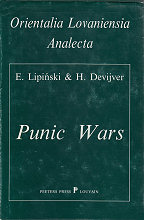
Punic wars (előszó)
FOREWORD
Prof. Dr. Jean VAN HOUTTE
Rector of the U.F.S.I.A.
It is a pleasure for me to welcome all the participants to this Eighth International Colloquium of Phoenician and Punic Studies in the Universitaire Faculteiten Sint Ignatius of the University Antwerp.
Some time ago I received a phone call from my friend and colleague Devijver, a very dynamic scholar. He asked "John, do you like to open a scientific symposium on Punic Wars" "Of course, I will do it with great pleasure".
Punic Wars! It was a long time ago that I read about Punic Wars. I think about forty years ago. I had some difficulties to remember the author... Yes, it was Titus Livius. I confess I had ambiguous feelings about the painful exhausting work of reading the latin of the Titus Livius. I took my Titus Livius again: Iam ver adpetebat; itaque Hannibal ex hibernis movit ... Ipse Hannibal ... elephanto vectus ... Sour-sweet memories. Back to the reality, to this colloquium, to your colloquium.
It is the first time that your group meets in this city, which is a commercial metropolis and a centre of arts, known from the end of the fifteenth century on for its international relations. It is therefore in line with an old tradition that, much to our satisfaction, we give hospitality in the premises of our Institution to your numerous group of scholars, coming from about a dozen of different countries. In fact, the Inter-University Contact Group of the Belgian National Fund for Scientific Research. which is responsible for these annual meetings, expressed in 1987 the wish of organizing this particular symposium in cooperation with the Department of History of our University and to deal with the important series of historical events known in ancient history under the name of "Punic Wars", although specialists in Carthaginian history would rightly prefer to call them "Roman Wars". In any case, this series of events of the third and second centuries B.C. opposed the two big powers of the time in a bitter struggle that lasted for almost one hundred and twenty years and spread over the whole West-Mediterranean area. These wars, fought on sea and on land, in Spain, Southern France. Italy and North Africa, came to an end with the destruction of Carthage in 146 B.C., but could have ended earlier in the complete triumph of Carthage, after the battle of Cannae, where the Romans were practically annihilated by Hannibal in 216 B.C. Therefore, one can hardly exaggerate when contending that the Punic Wars had tremendous consequences for the whole development of the West-European and West-Mediterranean civilization and history. It was, thus, an excellent idea of conveying an international conference devoted to the study of the background and the origins of these protracted conflicts between Rome and Carthage, dealing also with archaeological, epigraphical and numismatic evidences, as well as with historiographic testimonies related to these wars, and, last but not least, examining their consequences.
The survival of Punic language and of Punic culture in Roman North Africa down to the fourth or even fifth centuries A.D. signifies that the Carthaginian legacy was not completely lost in 146 B.C. On the contrary, at least some of its elements entered the common West-European and North-African heritage.
The impact of these conflicts on the subsequent history of the whole Mediterranean area and of Rome in particular was already clear to Polybius, who covers Roman history from crossing into Sicily against the Carthaginians in 264 and emphasizes the crucial importance of Hannibal's Spanish campaign in 220 B.C. "Hitherto, he writes, the affairs of the world had been as it were dispersed ... ; since this date history has formed an organic whole, and the affairs of Italy and Africa have been interlinked with those of Greece and Asia, all tending towards an end" (Pol. I, 3,3-4). Polybius defines the historian's task as the study and collation of documents, acquaintance with relevant geographical features and, finally, political experience (Pol. XII, 25e). Examining the rich and heavy program of your conference, one could perhaps stress, in addition, the important role of archaeological excavations, of underwater archaeology, of numismatics and epigraphy, that all deal with primary sources for the study of Antiquity. If Polybius was born two thousand years later, he would most likely have practised some of these disciplines, since he explains: "I sustained the perils of journeys through Africa, Spain and Gaul and of voyages on the sea adjoining these lands on the outside, in order to correct the errors of my predecessors" (Pol. III, 59,7). He did not neglect historiographic sources, however, but insisted that "a historian should not try to astonish his readers by sensationalism, ... but simply record what really happened and was said" (Pol. II, 56, 7ff.).
In your colloquium you will focus your attention on crucial events, not only of Carthaginian and Roman history, but of the Mediterranean and Western history as a whole. I am convinced that a better under-standing of these events will be one of the results of your meeting.